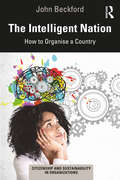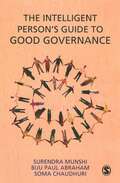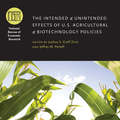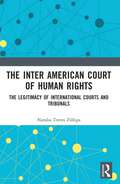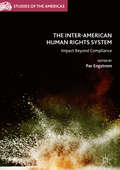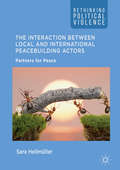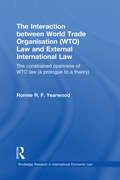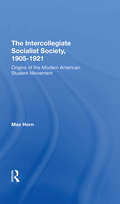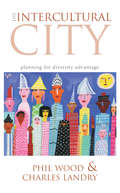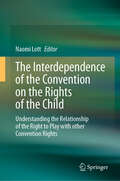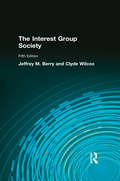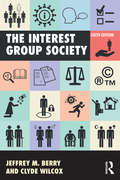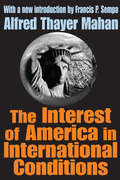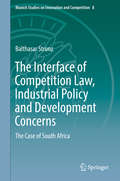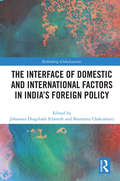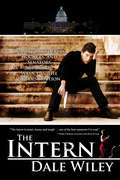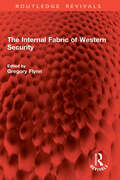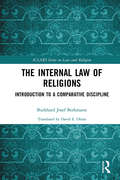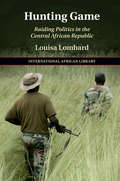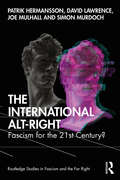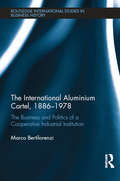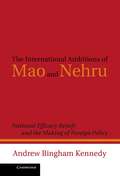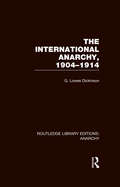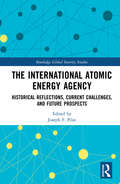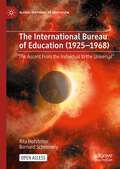- Table View
- List View
The Intelligent Nation: How to Organise a Country (Citizenship and Sustainability in Organizations)
by John BeckfordThe Intelligent Nation proposes a systemic and radical transformation of the organisation, management, ownership and performance of the services of the state by capitalising on the potential offered by contemporary information capability and fulfilling the rights and obligations both to and of citizens. In this book, John Beckford shows how, by adopting the principles of an Intelligent Organisation, the state can thrive and meet the needs of its citizens. He proposes a complete rethink of the state as the enabler or provider of public services. In particular, he points to the failure of the public sector to significantly emulate the massive gains in productivity and customer focus experienced in both manufacturing and services (e.g. finance, retailing, insurance). Governance and all public services must be redesigned to align to the contemporary needs of the citizen and exploit the power of information to enable a transformation of their effectiveness, redefine efficiency and support human-based services in crucial areas. Each chapter provides the key learning points, a discussion of the problem in theory and practice, integrated case studies, and discussion points. Written in an accessible style, the book provides thought-provoking supplemental reading for masters and undergraduate students reading organisation theory, organisation development, political science, public administration, healthcare, information systems and business and management science.
The Intelligent Person′s Guide to Good Governance
by Surendra Munshi Biju Paul Abraham Soma ChaudhuriAs good governance becomes more and more important with societies all over adjusting to the reality of the emerging world, the good governance discourse paradoxically seems to be exhausting itself. This is the time to revive it. The Intelligent Person′s Guide to Good Governance is unique in that it takes the discourse on governance beyond its self-inflicted narrow perspective by providing an integrated treatment of various relevant issues, for example, the role of the state or the idea of civil society. In carrying out a lucid analysis of a fluid concept, this book offers a ′one-stop′ resource for understanding the subject. The central argument of the book that any serious engagement with good governance must go beyond an exclusive reliance on the state or the market and explore different modes of partnerships, including public participation, is relevant and indeed timely in the present crisis. This book will interest all those concerned with the issues of governance. It will be particularly useful to students and research scholars in the fields of social sciences, management, administration and commerce.
The Intended and Unintended Effects of U.S. Agricultural and Biotechnology Policies
by Joshua S. Graff Zivin Jeffrey M. PerloffUsing economic models and empirical analysis, this volume examines a wide range of agricultural and biofuel policy issues and their effects on American agricultural and related agrarian insurance markets. Beginning with a look at the distribution of funds by insurance programs--created to support farmers but often benefiting crop processors instead--the book then examines the demand for biofuel and the effects of biofuel policies on agricultural price uncertainty. Also discussed are genetically engineered crops, which are assuming an increasingly important role in arbitrating tensions between energy production, environmental protection, and the global food supply. Other contributions discuss the major effects of genetic engineering on worldwide food markets. By addressing some of the most challenging topics at the intersection of agriculture and biotechnology, this volume informs crucial debates.
The Inter American Court of Human Rights: The Legitimacy of International Courts and Tribunals
by Natalia Torres ZúñigaThis book provides a critical legal perspective on the legitimacy of international courts and tribunals. The volume offers a critique of ideology of two legal approaches to the legitimacy of the Inter-American Court of Human Rights (IACtHR) that portray it as a supranational tribunal whose last say on human rights protection has a transformative effect on the democracies of Latin America. The book shows how the discussion between these Latin American legal strands mirrors global trends in the study of the legitimacy of international courts related to the use of constitutional analogies and concepts such as the notion of judicial dialogue and the idea of democratic transformation. It also provides an in-depth analysis of how, through the use of those categories, legal experts studying the legitimacy of the IACtHR enact self-validation processes by making themselves the principal agents of transformation. These self-validation processes work as ideological apparatuses that reproduce and entrench the mindset that the legal discipline is a driving force of change in itself. Further, the book shows how profiling the Court as an agent of transformation diverts attention from the ways in which it has pursued a particular view of human rights and democracy in the region that creates and reproduces relations of inequality and domination. Rather than discarding the IACtHR, this book aims to de-centre the focus away from formal legal institutions, engaging with the idea that ordinary people can mobilise and define the content of law to transform their lives and territories. The book will be a valuable resource for scholars working in the areas of human rights law, law, public international law, legal theory, constitutional law, political science and legal philosophy.
The Inter-American Human Rights System: Impact Beyond Compliance (Studies of the Americas)
by Par EngstromThis volume brings together innovative work from emerging and leading scholars in international law and political science to critically examine the impact of the Inter-American Human Rights System (IAHRS). By leveraging a variety of theoretical frameworks and methodological approaches, the contributors assess the impact of the IAHRS on domestic human rights change in Latin America. More specifically, the book provides a nuanced analysis of the System’s impact by examining the ways in which the IAHRS influences domestic actors and political institutions advancing the realisation of human rights. This work will be of interest to students and scholars of human rights and Latin American politics, as well as to those engaged with the nexus of international law and domestic politics and the dynamics of international and regional institutions.
The Interaction Between Local and International Peacebuilding Actors
by Sara HellmüllerThis book helps to better understand how the interaction between local and international peacebuilding actors influences the outcomes of their programs. Based on the case study of Ituri in the Democratic Republic of Congo, it analyses the relationships between local and international peacebuilding actors over the long term and assesses ways to overcome the obstacles to more cooperative partnerships. Focusing on perceptions, the book nuances existing definitions of war, peacebuilding and peace and allows for a more comprehensive understanding of conflict contexts. Thereby, it contributes to the literature on peacebuilding effectiveness and makes concrete suggestions for translating these findings into practice.
The Interaction between World Trade Organisation: The Constrained Openness of WTO Law (A Prologue to a Theory) (Routledge Research in International Economic Law)
by Ronnie R.F. YearwoodInternational legal scholarship is concerned with the fragmentation of international law into specialised legal systems such as trade, environment and human rights. Fragmentation raises questions about the inter-systemic interaction between the various specialised systems of international law. This study conceptually focuses on the interaction between World Trade Organisation (WTO) law and external international law. It introduces a legal theory of WTO law, constrained openness, as a way to understand that interaction. The idea is that WTO law, from its own internal point of view, constructs its own law. The effect is that external international law is not incorporated into WTO law wholesale, but is (re)constructed as WTO law. It follows that legal systems do not directly communicate with each other. Therefore, to influence WTO law, an indirect strategic approach is required, which recognises the functional nature of the differentiated systems of the fragmented international legal system.
The Intercollegiate Socialist Society, 1905-1921: Origins Of The Modern American Student Movement
by Max HornThe Intercollegiate Socialist Society—prototype of the modern American student movement and the ancestor of Students for a Democratic Society (SDS)—was the first nationally organized student group that had a distinct political and ideological orientation. Its social and economic concerns, among them the labor and women’s suffrage movements, encompassed most of the issues agitating a rapidly changing society during the first two decades of this century. The ISS started a tradition of student political awareness and protest that has persisted to our day. For more than 15 years, it provided a forum for a group of gifted young men and women who, then and later, exercised influence far out of proportion to their numbers. This first full-scale study of the ISS follows the society from its birth in 1905 to its decline during World War I and the postwar period. Relying largely on original sources, Horn examines the structure, ideology, program, and tactics of the ISS and assesses its impact on students, faculty, and college administrators.
The Intercultural City: Planning for Diversity Advantage
by Phil Wood Charles LandryIn a world of increasing mobility, how people of different cultures live together is a key issue of our age, especially for those responsible for planning and running cities. New thinking is needed on how diverse communities can cooperate in productive harmony instead of leading parallel or antagonistic lives. Policy is often dominated by mitigating the perceived negative effects of diversity, and little thought is given to how adiversity dividend or increased innovative capacity might be achieved. The Intercultural City, based on numerous case studies worldwide, analyses the links between urban change and cultural diversity. It draws on original research in the US, Europe, Australasia and the UK. It critiques past and current policy and introduces new conceptual frameworks. It provides significant and practical advice for readers, with new insights and tools for practitioners such as theintercultural lensindicators of opennessurban cultural literacy andten steps to an Intercultural City. Published with Comedia.
The Interdependence of the Convention on the Rights of the Child: Understanding the Relationship of the Right to Play with other Convention Rights
by Naomi LottThe book critically engages with the right to play and other Convention rights to explore their interdependence and interconnectivity. The book brings together experts across various children&’s rights topics and invites them to consider the intersections of their work with the child&’s right to play. It furthers the understanding and implementation of the right to play as this novel area of research develops. The book demonstrates both the interdependence of the rights within the Convention, and the unique and critical role of the right to play in achieving the aims of the Convention and the rights therein. It also extends the theoretical, methodological and critical scope of the discipline by considering children&’s rights in this interdependent manner. The contributions to this edited collection explore the role of the right to play in meeting obligations pertaining to the digital environment, identity rights, education, climate change and environmental health, refugees, girls&’ rights, social protection, healthcare and disability, and vice versa. By drawing together original and creative approaches to a number of pressing social questions and issues relating to human rights, this book has tangible application for developing both the content of the right to play and the potentials of this right for the wider child rights project. Furthermore, this book is pioneering in the field of children&’s rights in two key ways. Not only does it serve to contribute to filling a significant gap in the literature on the right to play, but it also stands as a crucial example of interdisciplinary legal research. Such an approach is critical for the field of children&’s rights due to the nature of childhood and the multidisciplinary relevance of children&’s rights and children&’s issues. This book thus serves as an example to push the field to be more contextual and interdisciplinary.
The Interest Group Society
by Clyde Wilcox Jeffrey M BerryConsidered the gold standard on interest group politics, this widely-used text analyzes interest groups within the intuitive framework of democratic theory, enabling readers to understand the workings of interest groups within the larger context of our political system. Comprehensive coverage includes not only the traditional farm, labor, and trade associations, but also citizen groups, public interest organizations, corporations, and public interest firms Brief in page count yet comprehensive in coverage, the book is flexible for different class settings. The book's rich content and lean size allows it to stand alone as the centerpiece of a course, or be assigned as one of several texts.
The Interest Group Society: Interest Group Society The_6 (Scott, Foresman/little, Brown Series In Political Science)
by Jeffrey M. Berry Clyde WilcoxConsidered the gold standard on interest group politics, this widely-used text analyzes interest groups within the intuitive framework of democratic theory, enabling readers to understand the workings of interest groups within the larger context of our political system. Comprehensive coverage includes not only the traditional farm, labor, and trade associations, but also citizen groups, public interest organizations, corporations, and public interest firms Brief in page count yet comprehensive in coverage, the book is flexible for different class settings. The book's rich content and lean size allows it to stand alone as the centerpiece of a course, or be assigned as one of several texts. New to the Sixth Edition Updates the role of money in interest group activity following the Citizens United Supreme Court decision. Covers new interest group actors including the Tea Party, Occupy, and others. Examines new developments in key interest group arenas including health care and the environment. Looks at the role of social media in interest groups. Adds a comparative look at interest group action, organization, and scholarship abroad.
The Interest of America in International Conditions
by Alfred Thayer MahanFour years before the outbreak of the First World War, Alfred Thayer Mahan, the world famous naval historian and strategist, warned of the approaching conflict in The Interest of America in International Conditions. Mahan's geo-historical approach compared Imperial Germany's early twentieth-century quest for hegemony to previous attempts by Napoleon's France, Louis XIV's France, and the Austrian and Spanish Hapsburgs to upset the European balance of power. Each previous bid for hegemony brought forth a coalition of powers that restored the balance of power. Mahan foresaw in the early twentieth century that a new coalition of powers, including Britain, France, Russia, and the United States, would be needed to prevent German domination of the continent.
The Interface of Competition Law, Industrial Policy and Development Concerns: The Case of South Africa (Munich Studies on Innovation and Competition #8)
by Balthasar StrunzThis book analyses essential concepts of competition law and industrial policy, and shows where the two areas clash with and complement each other, respectively. The discussion takes place in the context of developing countries, taking into consideration their realities and specific needs. South Africa serves as a real-world example for competition law that goes beyond the notion of consumer welfare. An in-depth analysis of the enforcement of South African law illustrates how the law is used both to combat the negative effects of past industrial policy, and to accommodate current economic and social needs.The book is intended for all readers with an interest in the enforcement of competition law in developing countries. It will particularly benefit those who want to learn about unorthodox approaches that integrate the concept of “public interest” and social imperatives into the application of competition law.
The Interface of Domestic and International Factors in India’s Foreign Policy (Rethinking Globalizations #1)
by Johannes Dragsbæk SchmidtThis book investigates the interplay of internal and external constraints, challenges and possibilities regarding foreign policy in India. It is the first attempt to systematically analyse and focus on the different actors and institutions in the domestic and international contexts who impose and push for various directions in India’s foreign policy. Rather than focusing on any one particular theme, the book explores the myriad aspects of foreign policymaking and the close interface between the domestic and external aspects in Indian policymaking. In turn, this relates to the structural issues shaping and reshaping the Asian regional dynamics and India’s connectivity within a globalized world. This book will be of great interest to postgraduate students; scholars of Asian Studies, development, and political science and international relations; and all those involved in policy - especially foreign policy - within India and South Asia. It will also be useful for people working in professional branches of consultancy and the private sector dealing with India and with South Asia in general.
The Intern: Chasing Murderers, Hookers, and Senators Across DC Wasn't In The Job Description
by Dale WileyIt's 1995, and life is great for Washington, DC intern Trent Norris. But life can change in a moment—and does when Trent becomes the prime suspect in two murders and a slew of other crimes. Overnight, he becomes the most wanted man in America. Trent has to find a way—any way—out. He holes up at The Watergate on a senator's dime and enlists a call girl as his unwitting ally. But with the media eating Trent alive, he doesn't have long before they catch him. From the tony clubs of Georgetown to murders on Capitol Hill, The Intern has all the twists and turns of a classic DC thriller, with an added comedic flair.
The Internal Fabric of Western Security (Routledge Revivals)
by Josef Joffe Gregory Flynn Laurence Martin Yves Laulan Stefano SilvestriChanges in domestic economic and political conditions, together with a loss of confidence in the United States leadership produced serious problems within the Atlantic Alliance. The Internal Fabric of Western Security (first published in 1981) examines the effects of domestic change upon perceived security requirements and explores ways to deal with the problems that developed.Beginning with an examination of Allied and European relations, the book outlines external challenges to security that the Alliance faces in the 1980s and discusses internal problems that affect member nations’ ability to deal with them. Country studies of the four largest European members of the Alliance systematically examine domestic constraints on security policy and assess probable approaches for the 1980s. A more general analysis is offered on how this situation affects the Allies’ ability to work together in dealing with their common security problems. The need to integrate economic and military requirements is also discussed.
The Internal Law of Religions: Introduction to a Comparative Discipline (ICLARS Series on Law and Religion)
by Burkhard Josef BerkmannComparative law of religions has developed in recent years as a new discipline at the intersection of legal and religious science, of theology and anthropology. This book presents a systematic theoretical basis for this new discipline. While law is mostly associated with the state, many religions also have their own internal law. These internal legal norms are aimed at a particular form of behaviour on the part of believers. They therefore play a particular role in conflicts arising today between certain religious forms of behaviour. The comparison of the internal law of religions serves to establish and explain the commonalities and differences between various religious legal traditions. The religions examined here include: the law of Christian denominations, Jewish law, Islamic law, Hindu law, Buddhist law, and other religious legal systems. The work assesses six current approaches to the comparative law of religions, evaluating their strengths and weaknesses, leading to the development of a new approach. The book discusses the role of religious law in state law and looks to likely future developments. The work will be essential for those interested in the administration of justice and politics, for those professions where intercultural competence is required, and for interreligious dialogue.
The International African Library: Raiding Politics In The Central African Republic (The\international African Library #61)
by Louisa LombardThe International Alt-Right: Fascism for the 21st Century? (Routledge Studies in Fascism and the Far Right)
by David Lawrence Patrik Hermansson Joe Mulhall Simon MurdochThe alt-right has been the most important new far-right grouping to appear in decades. Written by researchers from the anti-racist advocacy group HOPE not hate, this book provides a thorough, ground-breaking, and accessible overview of this dangerous new phenomenon. It explains where the alt-right came from, its history so far, what it believes, how it organises and operates, and its future trajectory. The alt-right is a genuinely transnational movement and this book is unique in offering a truly international perspective, outlining the influence of European ideas and movements as well as the alt-right's development in, and attitude towards, countries as diverse as Japan, India, and Russia. It examines the ideological tributaries that coagulated to form the alt-right, such as white supremacy, the neo-reactionary blogosphere, the European New Right, the anti-feminist manosphere, the libertarian movement, and digital hate culture exemplified by offensive memes and trolling. The authors explore the alt-right's views on gender, sexuality and masculinity, antisemitism and the Holocaust, race and IQ, globalisation and culture as well as its use of violence. The alt-right is a thoroughly modern far-right movement that uses cutting edge technology and this book reveals how they use cryptocurrencies, encryption, hacking, "meme warfare", social media, and the dark web. This will be essential reading for scholars and activists alike with an interest in race relations, fascism, extremism, and social movements.
The International Aluminium Cartel: The Business and Politics of a Cooperative Industrial Institution (1886-1978) (Routledge International Studies in Business History)
by Marco BertilorenziAluminium was one of most cartelised industries in the international economic panorama of the 20th century. Born following the discovery of electrolytic smelting process in 1886, this industry, even in its infancy, established a cartel which characterised its history until nearly 1980. Managers of the aluminium industry from various historical eras and countries shared the same vision about the development of their industry: to keep prices as stable as possible in order to encourage expansions and to provide return on investments. Price instability, which characterised the trade of other commodities, was unknown to the aluminium industry. This book neither argues that cartels are fundamentally evil, nor attempts to demonstrate that cartels are optimal business organisations. It instead provides an in-depth and frank analysis of the internal working of industrial organisations and of the interplay between cartels and political powers and institutions. The International Aluminium Cartel offers explanations for the construction and collapse of cartels, descriptions of their operations, and an historical interpretation of their experiences. Incorporating information gleaned from a unique collection of private and public archives from several countries, this unique study will appeal to a wide variety of readers, including academics interested in industrial and business history.
The International Ambitions of Mao and Nehru
by Andrew KennedyWhy do leaders sometimes challenge, rather than accept, the international structures that surround their states? In The International Ambitions of Mao and Nehru, Andrew Kennedy answers this question through in-depth studies of Chinese foreign policy under Mao Zedong and Indian foreign policy under Jawaharlal Nehru. Drawing on international relations theory and psychological research, Kennedy offers a new theoretical explanation for bold leadership in foreign policy, one that stresses the beliefs that leaders develop about the 'national efficacy' of their states. He shows how this approach illuminates several of Mao and Nehru's most important military and diplomatic decisions, drawing on archival evidence and primary source materials from China, India, the United States and the United Kingdom. A rare blend of theoretical innovation and historical scholarship, The International Ambitions of Mao and Nehru is a fascinating portrait of how foreign policy decisions are made.
The International Anarchy (Routledge Library Editions: Anarchy)
by G. Lowes DickinsonThis volume, a classic of its time, discusses the tragic evolution of European politics from 1870-1914. The main part of the book describes the development of the relations between France, Germany, Russia and Britain and follows the sequence of political events, the Triple Alliance and Bismarck's secret treaties, the Triple Entente, Morocco and the Conference of Algeciras, The Annexation of Bosnia, Agadir, Tripoli, the Bagdad Railway, Persia, the Far East, the Balkan Wars. Its value remains because while other books deal with the actions of individuals, this volume indicates the underlying forces of which they were the victims.
The International Atomic Energy Agency: Historical Reflections, Current Challenges and Future Prospects (Routledge Global Security Studies)
by Joseph F. PilatThis volume offers a wide-ranging examination and discussion of the International Atomic Energy Agency’s (IAEA) past, present and future as it enters its seventh decade. Including contributions from leading experts across the globe, the book assesses the historical record of the IAEA; the issues and challenges it faces at present; and its future prospects. In doing so, it addresses the primary missions of the IAEA outlined in the IAEA’s statute, i.e., to safeguard and promote the peaceful uses of nuclear energy, as well as the missions over which it is expanding its mandate, including nuclear safety and security. The volume is divided into two parts: Part I focuses on historical recollections and reflections of participants in key events, ranging from a personal account of the initial negotiations of the IAEA to an account by its chairman on the dynamics of the Board of Governors in recent years. Part II covers current and future issues in the IAEA’s role in nuclear safeguards, the peaceful uses of nuclear energy, and nuclear safety and security. This book will be of much interest to students of nuclear proliferation and arms control, global governance and international security in general.
The International Bureau of Education: "The Ascent From the Individual to the Universal" (Global Histories of Education)
by Rita Hofstetter Bernard SchneuwlyThis open access book offers a critical analysis of the history of the International Bureau of Education (IBE) from its founding in 1925 to its integration into UNESCO in January 1969. Based on the conceptual and methodological tools of the transnational turn and on archives, fully exploited for the first time by the research team, this book enriches knowledge of the phenomena of globalization. It does so in a field, education, which is currently one of those most invested in globalization, but whose sociogenesis in the era of its first period of institutionalization remains to be explored more profoundly. The authors do this by analyzing how the actors of the IBE tried to realize their aspiration towards universal aims in education, the contradictions they were confronted with, the causes they invested in, their operating mode and the governments and international organizations with which they cooperated.
